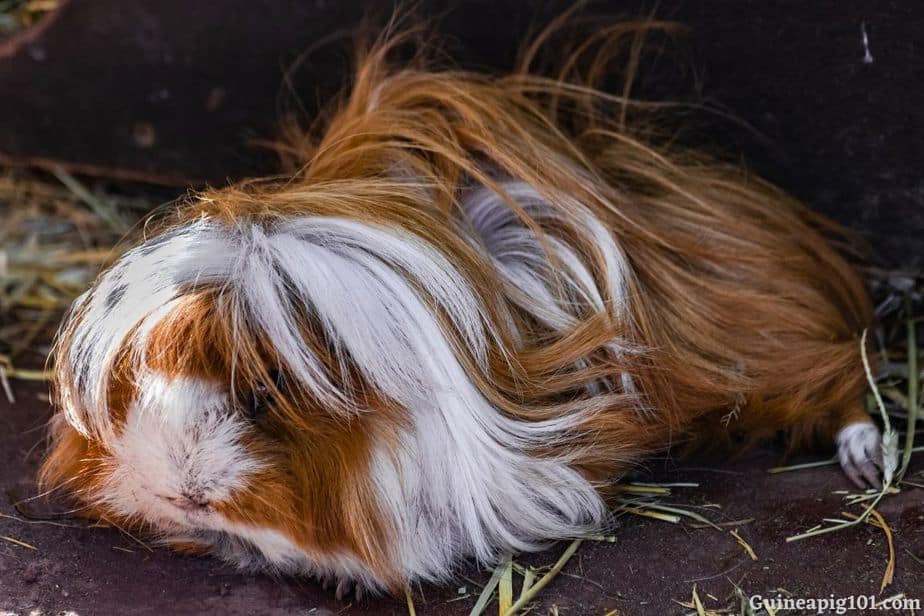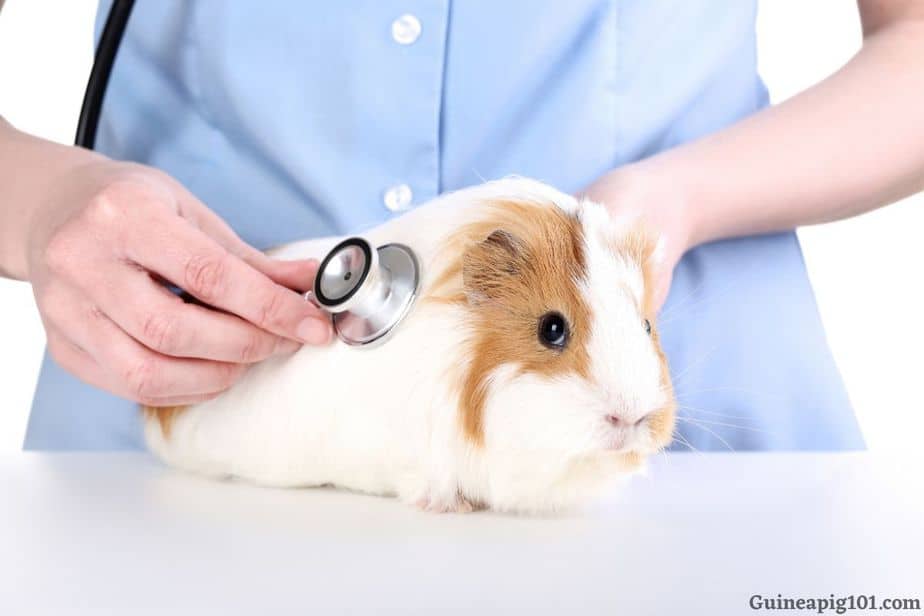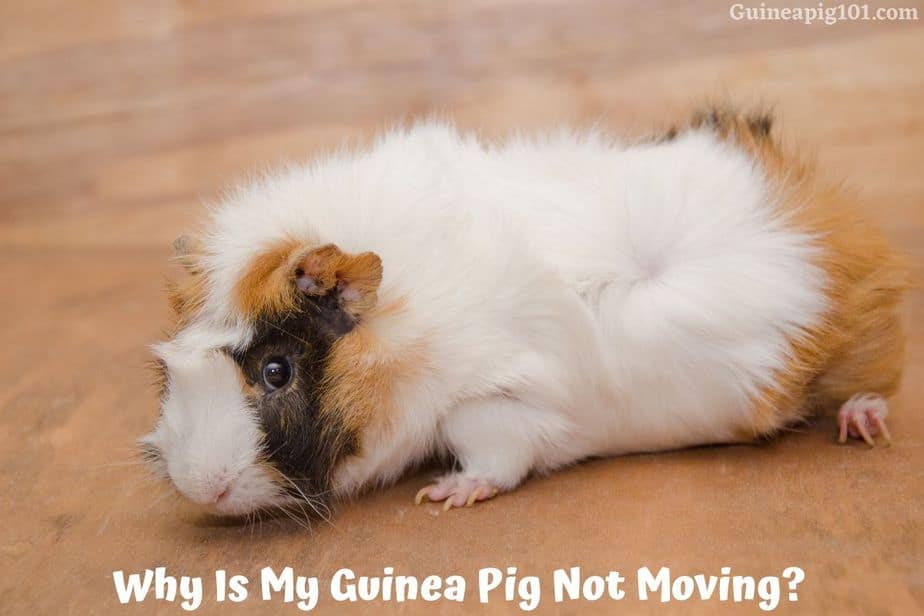It can be a matter of concern if your guinea pig is not moving at all. But why is your guinea pig not moving? Is it ill? Is it feeling lethargic? Or is it something you should not worry about?
Guinea pigs will not move if they are frightened. Severe pain due to illness or old age arthritis pain could also be a significant factor due to which your guinea pig might not be moving. New guinea pigs are likely to hide and not move around much as they are not used to the new environment.
If your guinea pig is not eating and defecating, it is a major health issue that needs an immediate vet visit.
Guinea pigs are active animals, and they are likely to run and play around their cages.
Sometimes you may notice a sudden change in their behavior. This could be an early sign of health issues, and you must not take it lightly.
However, not all the time, it means they are ill.
A new guinea pig that you got home just a few days back might move or come out of hiding for several days. But does that mean they are ill?
No, they are not. They are getting used to their new environment. It might take a while before they start showing their usual behavior.
So, with that out of the way, let us dive a little deeper into the topic.
In this article, I shall discuss several instances when not moving around much could be the normal behavior of your guinea pigs, and when you should be worried about your guinea pigs.
So, let’s dive straight into it.

Is it normal for a guinea pig to not move?
No, it is not normal for guinea pigs to be not moving.
If the guinea pig is well settled in, then chances are they are suffering from some severe health problems.
Arthritis, paralysis, severe pain could be some of the major factors due to which your guinea pigs are unable to move properly.
Fear is another main reason that can make your guinea pigs freeze.
If your guinea pig is frightened by a sudden noise or the presence of predators nearby, then they may not move at all to avoid getting attraction.
If your guinea pig is hiding, not moving, or eating, you should definitely be concerned and visit a vet as soon as possible.
What does it mean when a guinea pig is not moving?
There can be a lot of reasons due to which your guinea pigs are not moving.
While some causes are natural and can get fixed over time, others might need some thorough examination and medical assistance.
Let us have a look at different instances and what it means for you and your guinea pigs.
Guinea pig not moving but breathing
If your guinea pig is not moving at all and has some breathing pattern changes, it probably means they have some underlying health concerns.
Some of the common health problems are:
- Overheat or Heatstroke: Guinea pigs cannot tolerate extreme temperatures. If your guinea pig is housed in a place where temperatures go beyond 25°C(77°F), you definitely need to take some extra care to keep your guinea pigs cool. Direct or partial sun exposure can also quickly overheat your guinea pigs, leading to breathing fast and other severe health issues.
- Respiratory illness: Respiratory illness, including pneumonia and Upper respiratory infection, are some common health problems in guinea pigs. Guinea pigs suffering from severe respiratory issues might have a hard time breathing, and thus they won’t be able to move around much.
Do make sure that you take your guinea pigs to a professional vet for check up if you see any signs of labored or heavy breathing in your guinea pigs.
Guinea pig not moving back legs
If your guinea pig is not moving its back legs, then it means something is wrong with them.
There can be two major causes that could lead to guinea pigs dragging their back legs. These includes:
- Hind leg paralysis: Hind leg paralysis is a rare occurrence in guinea pigs, but it indeed is something you must be aware of. There is no concrete justification for what can be causing the issue, but some initial studies claim that a lack of calcium in the diet of our guinea pigs can be the cause. Most guinea pig owners try to cut down of calcium to prevent bladder stones. However, if you cut down too much on it, it can lead to paralysis in guinea pigs.
- Injury: Guinea pigs are active animals, and they can get injured as they play around and jump. Ensure your cage doesn’t have levels too high from where your guinea pigs can jump or fall off. While carrying your guinea pigs around, you must also ensure you don’t let them jump off from a height of 2-3 feet. A fall from that height can result in limb or tissue damage due to which your guinea pigs might not be able to move well.
Look out for signs of physical injury or any other signs that indicate your guinea pigs are ill. Schedule a vet appointment if needed.
Guinea pig not eating or moving

If your guinea pig is not moving around, eating, or drinking something, it means something is wrong with them.
There can be a lot of reasons why your guinea pigs might not be eating or moving around. Some of the common problems include malnutrition, dental problems, gastrointestinal problems, etc.
In most cases, if your guinea pigs are not eating their regular diet, they can become weak and might not be able to move or play around as usual.
Thus, you should make sure you take them to a vet immediately. The vet may ask for blood tests and radiographs.
Guinea pig not moving and twitching
If your guinea pig is not moving and twitching, then it is probably a sign of mange mites. It is common in guinea pigs.
These mites can lead to intense itching in guinea pigs, which makes them fall on sides and twitch like they have a seizure attack.
While the reality is it is the effect of these mites burrows under the skin.
You can learn more about different parasites and mites in guinea pigs from our detailed article.
Baby guinea pig not moving
It is completely normal for a baby guinea pig not to move around much. You must watch out carefully to see if they are breathing normally.
Let them be with their mother until they are weaned.
It is entirely normal for your baby guinea pigs to lie around their mother for the first few hours. They should start moving around within a day or two.
Guinea pig cold and not moving

If your guinea pig seems cold and not moving at all, then chances are they have passed away.
I know it can be a heartbreaking moment for any guinea pig owner, but it is a reality that every owner has to go through.
However, sometimes guinea pigs pass away suddenly without showing any signs of prior sickness.
Heart attack or some similar health issues can be the cause behind the same.
Guinea pig not moving after surgery

Surgery like spaying, neutering, dental surgery, etc. requires some intense medical treatment that can leave your guinea pigs in trauma.
Your guinea pigs might experience pain for a few days after major surgery. Thus, they are likely to hide and not move around much.
They might not be interested in eating as well. If your guinea pig does so, you can consult your vet and get some medicine for reducing their pain.
New guinea pig not moving

It is quite normal for a new guinea pig to hide and not move around much.
As guinea pigs are prey animals, bringing them into a new living environment can make them feel vulnerable for a few days.
You might need to leave them alone for some time and let them settle in the new environment.
Once your guinea pigs are used to the environment, they are more likely to move around even in your presence.
What should you do if your guinea pig is not moving?
It is crucial to look out for the signs of health issues and consult a vet immediately if your guinea pig is not moving at all.
Apart from that, there are a few things you can do to determine the cause for the same and provide First Aid to your guinea pigs in case it is needed.
Here are the things you must keep in mind:
- If you see your guinea pig is breathing fast or heavy, then you must try to cool them down. Check their body temperature, touch their ears to see if they are hot. An overheat, or heatstroke can often leave your guinea pigs in such conditions.
- If you suspect that your guinea pigs have any injury in their legs or other parts of their body, then you must take them to a vet immediately. If it is bleeding, then you can apply some antiseptic like betadine to clean the wound before you reach the vet.
- Look out for their feces and urine excretion. If you notice they have not passed any fecal excretion for quite some time, then it could be a sign of severe health problems, including GI stasis.
- Feeding your guinea pigs with critical care could make the difference when it comes to improving their health. You must ensure that your guinea pigs eat something to keep their digestive system going, and they don’t get malnourished.
- An ill guinea pig can have severe pain or other problems limiting their movement. You must ensure that you take proper care of sick guinea pigs and provide them with appropriate treatment.
- Stress can also be a significant factor leading to a change in behavior in your guinea pigs. A depressed or stressed guinea pig is more likely to hide and sit in a particular place. Try to cheer them up and provide some additional care to them.
Sources: Heatstroke in guinea pigs, Heatstroke: opioid-mediated mechanisms, A suitable environment for guinea pigs, Nutrient Requirements of the Guinea Pig, The effects of diet on guinea pigs, Guinea Pig Diet, Patterns of feeding in the Guinea pig.
